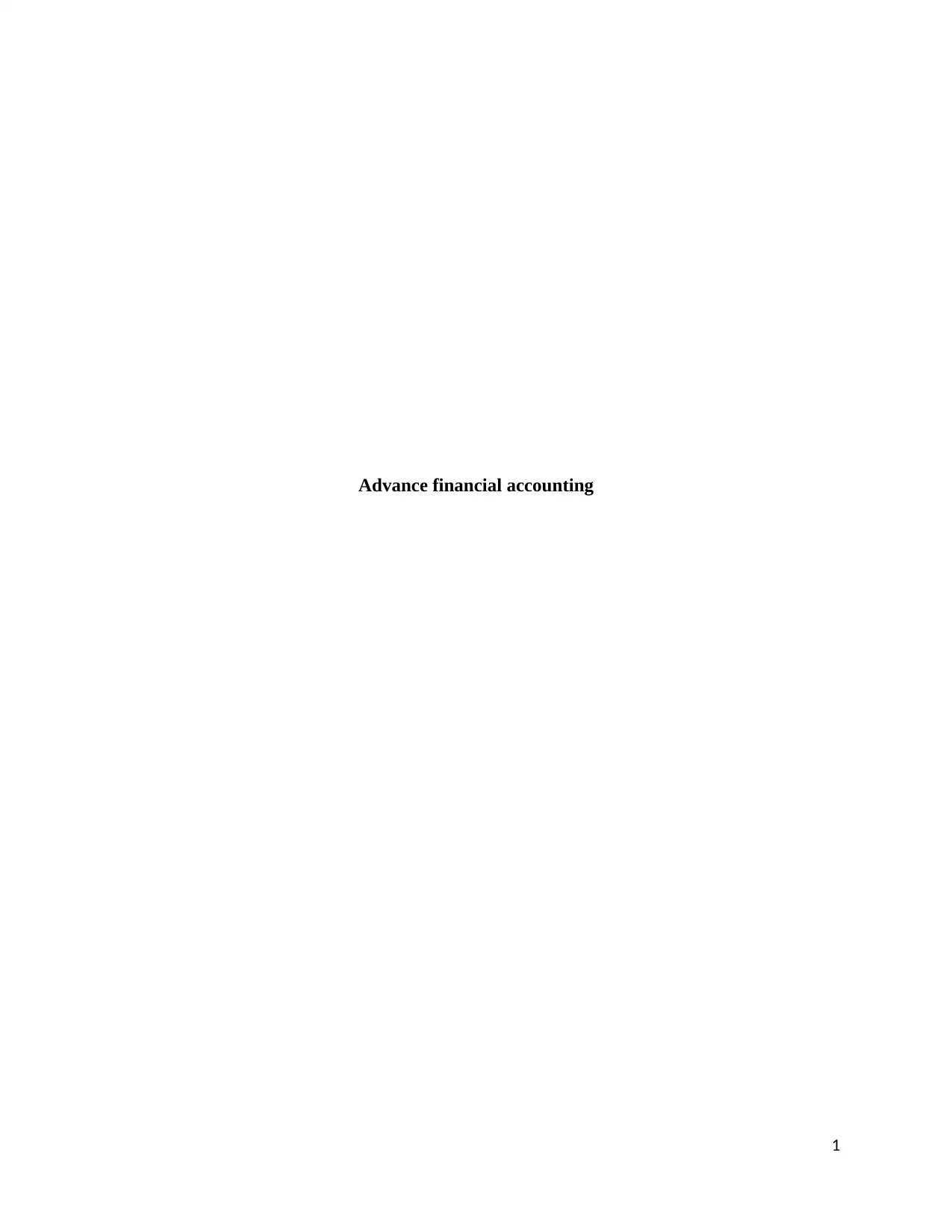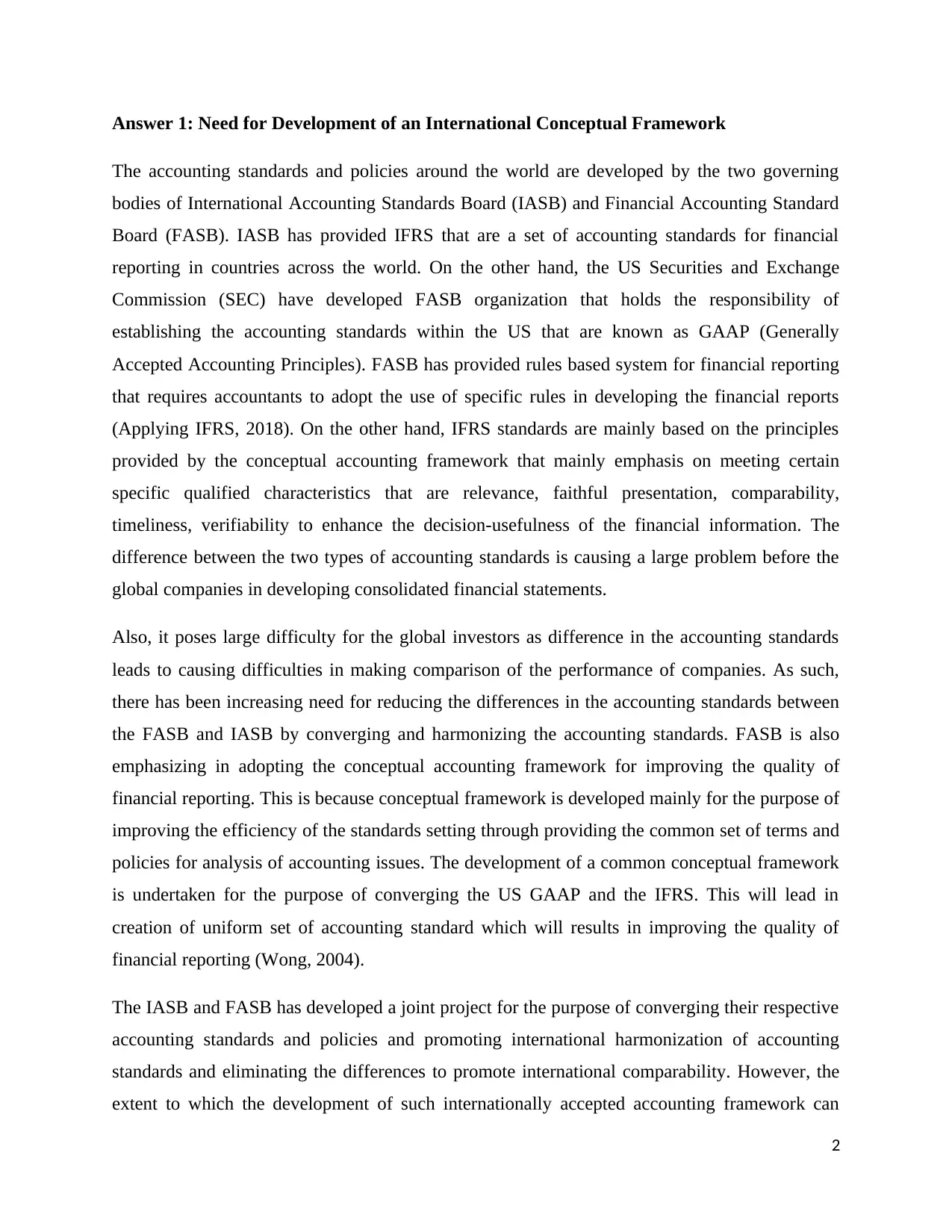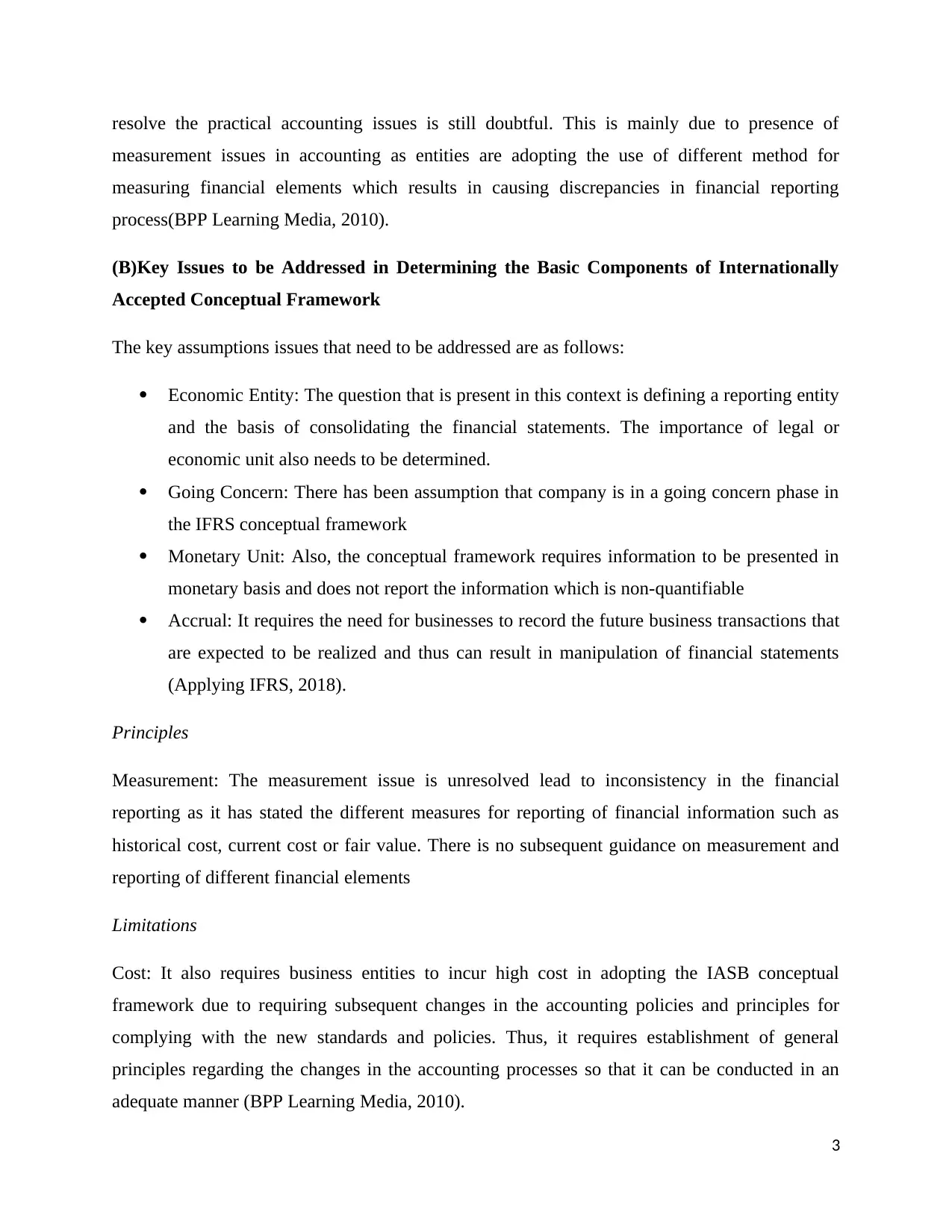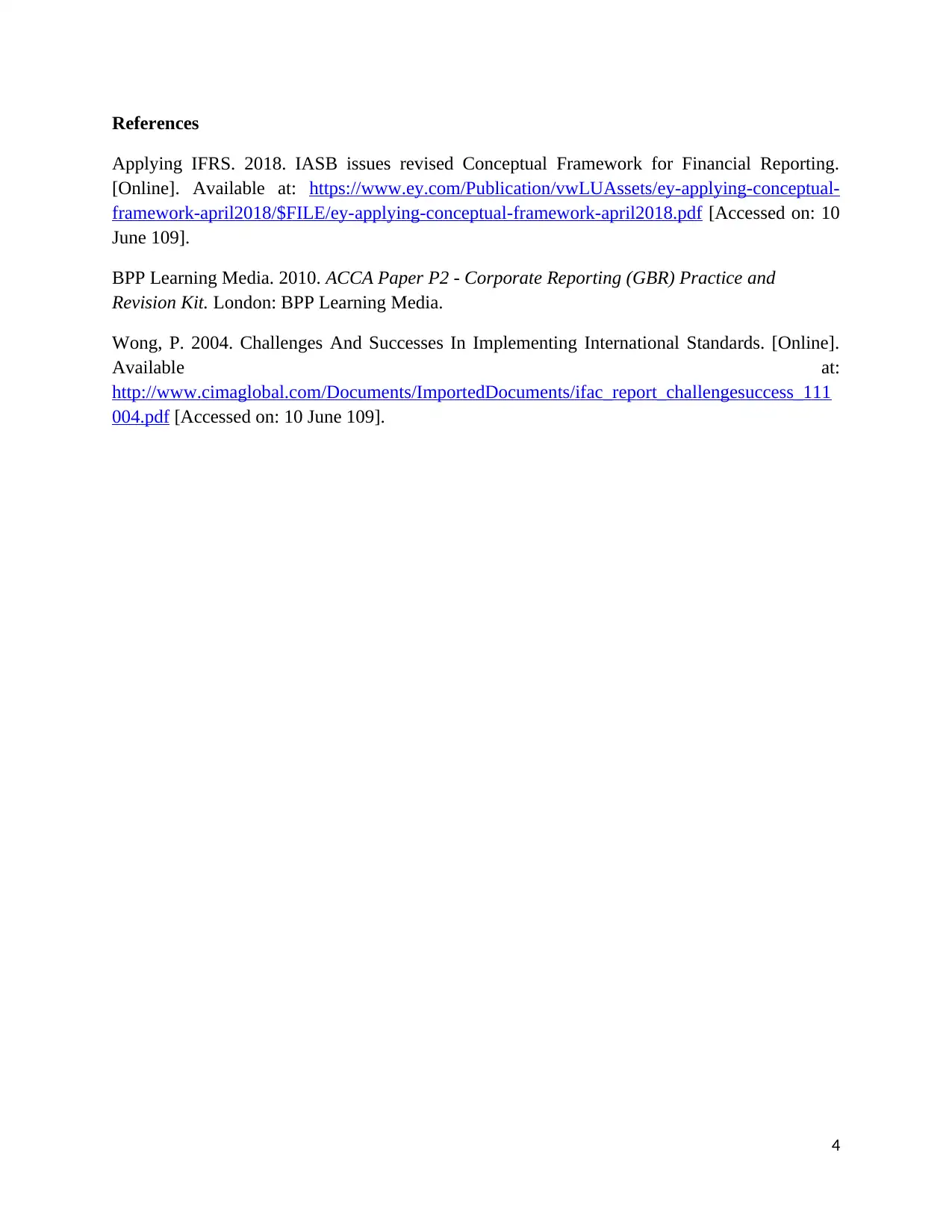Analysis of International Conceptual Framework in Accounting
VerifiedAdded on 2022/12/28
|4
|838
|67
Report
AI Summary
This report delves into the necessity of developing an international conceptual framework in financial accounting, highlighting the roles of IASB and FASB in setting accounting standards. It examines the differences between IFRS and GAAP and the challenges these pose for global companies and investors. The report emphasizes the need for convergence and harmonization of accounting standards to improve the quality of financial reporting. It further identifies key issues to be addressed in determining the basic components of an internationally accepted conceptual framework, including economic entity, going concern, monetary unit, accrual accounting, measurement principles, and cost limitations. The analysis underscores the importance of a common conceptual framework in resolving practical accounting issues and promoting international comparability. The report references relevant sources such as EY and BPP Learning Media to support its claims.

Advance financial accounting
1
1
Paraphrase This Document
Need a fresh take? Get an instant paraphrase of this document with our AI Paraphraser

Answer 1: Need for Development of an International Conceptual Framework
The accounting standards and policies around the world are developed by the two governing
bodies of International Accounting Standards Board (IASB) and Financial Accounting Standard
Board (FASB). IASB has provided IFRS that are a set of accounting standards for financial
reporting in countries across the world. On the other hand, the US Securities and Exchange
Commission (SEC) have developed FASB organization that holds the responsibility of
establishing the accounting standards within the US that are known as GAAP (Generally
Accepted Accounting Principles). FASB has provided rules based system for financial reporting
that requires accountants to adopt the use of specific rules in developing the financial reports
(Applying IFRS, 2018). On the other hand, IFRS standards are mainly based on the principles
provided by the conceptual accounting framework that mainly emphasis on meeting certain
specific qualified characteristics that are relevance, faithful presentation, comparability,
timeliness, verifiability to enhance the decision-usefulness of the financial information. The
difference between the two types of accounting standards is causing a large problem before the
global companies in developing consolidated financial statements.
Also, it poses large difficulty for the global investors as difference in the accounting standards
leads to causing difficulties in making comparison of the performance of companies. As such,
there has been increasing need for reducing the differences in the accounting standards between
the FASB and IASB by converging and harmonizing the accounting standards. FASB is also
emphasizing in adopting the conceptual accounting framework for improving the quality of
financial reporting. This is because conceptual framework is developed mainly for the purpose of
improving the efficiency of the standards setting through providing the common set of terms and
policies for analysis of accounting issues. The development of a common conceptual framework
is undertaken for the purpose of converging the US GAAP and the IFRS. This will lead in
creation of uniform set of accounting standard which will results in improving the quality of
financial reporting (Wong, 2004).
The IASB and FASB has developed a joint project for the purpose of converging their respective
accounting standards and policies and promoting international harmonization of accounting
standards and eliminating the differences to promote international comparability. However, the
extent to which the development of such internationally accepted accounting framework can
2
The accounting standards and policies around the world are developed by the two governing
bodies of International Accounting Standards Board (IASB) and Financial Accounting Standard
Board (FASB). IASB has provided IFRS that are a set of accounting standards for financial
reporting in countries across the world. On the other hand, the US Securities and Exchange
Commission (SEC) have developed FASB organization that holds the responsibility of
establishing the accounting standards within the US that are known as GAAP (Generally
Accepted Accounting Principles). FASB has provided rules based system for financial reporting
that requires accountants to adopt the use of specific rules in developing the financial reports
(Applying IFRS, 2018). On the other hand, IFRS standards are mainly based on the principles
provided by the conceptual accounting framework that mainly emphasis on meeting certain
specific qualified characteristics that are relevance, faithful presentation, comparability,
timeliness, verifiability to enhance the decision-usefulness of the financial information. The
difference between the two types of accounting standards is causing a large problem before the
global companies in developing consolidated financial statements.
Also, it poses large difficulty for the global investors as difference in the accounting standards
leads to causing difficulties in making comparison of the performance of companies. As such,
there has been increasing need for reducing the differences in the accounting standards between
the FASB and IASB by converging and harmonizing the accounting standards. FASB is also
emphasizing in adopting the conceptual accounting framework for improving the quality of
financial reporting. This is because conceptual framework is developed mainly for the purpose of
improving the efficiency of the standards setting through providing the common set of terms and
policies for analysis of accounting issues. The development of a common conceptual framework
is undertaken for the purpose of converging the US GAAP and the IFRS. This will lead in
creation of uniform set of accounting standard which will results in improving the quality of
financial reporting (Wong, 2004).
The IASB and FASB has developed a joint project for the purpose of converging their respective
accounting standards and policies and promoting international harmonization of accounting
standards and eliminating the differences to promote international comparability. However, the
extent to which the development of such internationally accepted accounting framework can
2

resolve the practical accounting issues is still doubtful. This is mainly due to presence of
measurement issues in accounting as entities are adopting the use of different method for
measuring financial elements which results in causing discrepancies in financial reporting
process(BPP Learning Media, 2010).
(B)Key Issues to be Addressed in Determining the Basic Components of Internationally
Accepted Conceptual Framework
The key assumptions issues that need to be addressed are as follows:
Economic Entity: The question that is present in this context is defining a reporting entity
and the basis of consolidating the financial statements. The importance of legal or
economic unit also needs to be determined.
Going Concern: There has been assumption that company is in a going concern phase in
the IFRS conceptual framework
Monetary Unit: Also, the conceptual framework requires information to be presented in
monetary basis and does not report the information which is non-quantifiable
Accrual: It requires the need for businesses to record the future business transactions that
are expected to be realized and thus can result in manipulation of financial statements
(Applying IFRS, 2018).
Principles
Measurement: The measurement issue is unresolved lead to inconsistency in the financial
reporting as it has stated the different measures for reporting of financial information such as
historical cost, current cost or fair value. There is no subsequent guidance on measurement and
reporting of different financial elements
Limitations
Cost: It also requires business entities to incur high cost in adopting the IASB conceptual
framework due to requiring subsequent changes in the accounting policies and principles for
complying with the new standards and policies. Thus, it requires establishment of general
principles regarding the changes in the accounting processes so that it can be conducted in an
adequate manner (BPP Learning Media, 2010).
3
measurement issues in accounting as entities are adopting the use of different method for
measuring financial elements which results in causing discrepancies in financial reporting
process(BPP Learning Media, 2010).
(B)Key Issues to be Addressed in Determining the Basic Components of Internationally
Accepted Conceptual Framework
The key assumptions issues that need to be addressed are as follows:
Economic Entity: The question that is present in this context is defining a reporting entity
and the basis of consolidating the financial statements. The importance of legal or
economic unit also needs to be determined.
Going Concern: There has been assumption that company is in a going concern phase in
the IFRS conceptual framework
Monetary Unit: Also, the conceptual framework requires information to be presented in
monetary basis and does not report the information which is non-quantifiable
Accrual: It requires the need for businesses to record the future business transactions that
are expected to be realized and thus can result in manipulation of financial statements
(Applying IFRS, 2018).
Principles
Measurement: The measurement issue is unresolved lead to inconsistency in the financial
reporting as it has stated the different measures for reporting of financial information such as
historical cost, current cost or fair value. There is no subsequent guidance on measurement and
reporting of different financial elements
Limitations
Cost: It also requires business entities to incur high cost in adopting the IASB conceptual
framework due to requiring subsequent changes in the accounting policies and principles for
complying with the new standards and policies. Thus, it requires establishment of general
principles regarding the changes in the accounting processes so that it can be conducted in an
adequate manner (BPP Learning Media, 2010).
3
⊘ This is a preview!⊘
Do you want full access?
Subscribe today to unlock all pages.

Trusted by 1+ million students worldwide

References
Applying IFRS. 2018. IASB issues revised Conceptual Framework for Financial Reporting.
[Online]. Available at: https://www.ey.com/Publication/vwLUAssets/ey-applying-conceptual-
framework-april2018/$FILE/ey-applying-conceptual-framework-april2018.pdf [Accessed on: 10
June 109].
BPP Learning Media. 2010. ACCA Paper P2 - Corporate Reporting (GBR) Practice and
Revision Kit. London: BPP Learning Media.
Wong, P. 2004. Challenges And Successes In Implementing International Standards. [Online].
Available at:
http://www.cimaglobal.com/Documents/ImportedDocuments/ifac_report_challengesuccess_111
004.pdf [Accessed on: 10 June 109].
4
Applying IFRS. 2018. IASB issues revised Conceptual Framework for Financial Reporting.
[Online]. Available at: https://www.ey.com/Publication/vwLUAssets/ey-applying-conceptual-
framework-april2018/$FILE/ey-applying-conceptual-framework-april2018.pdf [Accessed on: 10
June 109].
BPP Learning Media. 2010. ACCA Paper P2 - Corporate Reporting (GBR) Practice and
Revision Kit. London: BPP Learning Media.
Wong, P. 2004. Challenges And Successes In Implementing International Standards. [Online].
Available at:
http://www.cimaglobal.com/Documents/ImportedDocuments/ifac_report_challengesuccess_111
004.pdf [Accessed on: 10 June 109].
4
1 out of 4
Related Documents
Your All-in-One AI-Powered Toolkit for Academic Success.
+13062052269
info@desklib.com
Available 24*7 on WhatsApp / Email
![[object Object]](/_next/static/media/star-bottom.7253800d.svg)
Unlock your academic potential
Copyright © 2020–2026 A2Z Services. All Rights Reserved. Developed and managed by ZUCOL.




